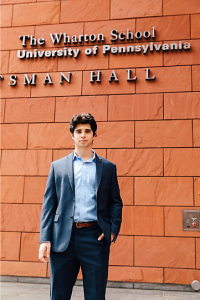Do Economic Stimulus Payments And Inflation Go Hand In Hand? Finance Phenom Max Arias of Wharton School Says No
PHILADELPHIA, PA, UNITED STATES, September 14, 2020 /EINPresswire.com/ -- The COVID-19 crisis has hit the United States hard, and financial experts had differing opinions on how the pandemic stimulus payments would affect the economy. Some felt that these payments would cause inflation, essentially rendering such payments ineffective over time. Max Arias of Wharton School is studying behavioral economics, and he believes the stimulus payments were a smart move. “Essentially its not a stimulus but rather restitution for forced shut down of economic activity similar to the takings clause” says Max.
Max Arias of The Wharton School says that it's important to understand when and why inflation occurs. “Inflation only occurs when disposable income and aggregate spending habits of people in an economy increase, supporting higher prices for products and market wages, or when the value of a currency depreciates relative to others," according to Max Arias of Wharton School. “This means that in order for inflation to happen, people's spending and savings habits need to remain at the same levels they were pre-pandemic, which current data does not reflect as people’s propensity to save is increasing.” The stimulus payment wasn't large enough for most people to create significantly different spending habits, according to Max Arias of Wharton School.
The stimulus payments were given for people to spend on basic necessities, and by and large, this is what happened. Of course, there were some outliers (like people who worked overtime due to COVID-19 and were able to pocket their stimulus money).
When considering an increase in spending due to stimulus payments, Max Arias of Wharton School says, "This likely won’t happen at least in the short run in the United States. Data already shows that macroeconomic consumption ratios are decreasing and the savings ratio is increasing." According to Max Arias of Wharton School, people are being smarter with their money. Data shows that people are learning to save, rather than increasing their spending habits when they get a short-term increase in cash flow during a hard economic time.
Max Arias of Wharton School believes that in order for inflation to occur, people would need to significantly alter their spending lifestyles, and that just isn't happening with the economic stimulus payments due to the pandemic. If the stimulus payments continue for an extended period of time, and are an amount large enough to create a change in spending habits, it's possible that inflation could occur, according to Max Arias of Wharton School.
Max Arias of Wharton School says that the current stimulus payment set up (and the fact that a second payment has yet to be confirmed) means that significant economic changes are not likely to occur at this time. Of course, this could change in the future, if more payments are in store for the United States public.
In addition to the lack of spending habits change in the United States, Max Arias of Wharton School also believes that the US dollar is strong enough to keep inflation at bay for the time being. "Also, US investments are seen as safer than foreign alternatives, thus increasing the demand for dollars and supporting its exchange rate,” Max Arias of Wharton School says.

Max Arias of The Wharton School says that it's important to understand when and why inflation occurs. “Inflation only occurs when disposable income and aggregate spending habits of people in an economy increase, supporting higher prices for products and market wages, or when the value of a currency depreciates relative to others," according to Max Arias of Wharton School. “This means that in order for inflation to happen, people's spending and savings habits need to remain at the same levels they were pre-pandemic, which current data does not reflect as people’s propensity to save is increasing.” The stimulus payment wasn't large enough for most people to create significantly different spending habits, according to Max Arias of Wharton School.
The stimulus payments were given for people to spend on basic necessities, and by and large, this is what happened. Of course, there were some outliers (like people who worked overtime due to COVID-19 and were able to pocket their stimulus money).
When considering an increase in spending due to stimulus payments, Max Arias of Wharton School says, "This likely won’t happen at least in the short run in the United States. Data already shows that macroeconomic consumption ratios are decreasing and the savings ratio is increasing." According to Max Arias of Wharton School, people are being smarter with their money. Data shows that people are learning to save, rather than increasing their spending habits when they get a short-term increase in cash flow during a hard economic time.
Max Arias of Wharton School believes that in order for inflation to occur, people would need to significantly alter their spending lifestyles, and that just isn't happening with the economic stimulus payments due to the pandemic. If the stimulus payments continue for an extended period of time, and are an amount large enough to create a change in spending habits, it's possible that inflation could occur, according to Max Arias of Wharton School.
Max Arias of Wharton School says that the current stimulus payment set up (and the fact that a second payment has yet to be confirmed) means that significant economic changes are not likely to occur at this time. Of course, this could change in the future, if more payments are in store for the United States public.
In addition to the lack of spending habits change in the United States, Max Arias of Wharton School also believes that the US dollar is strong enough to keep inflation at bay for the time being. "Also, US investments are seen as safer than foreign alternatives, thus increasing the demand for dollars and supporting its exchange rate,” Max Arias of Wharton School says.
Caroline Hunter
Web Presence, LLC
+1 786-233-8220
email us here

